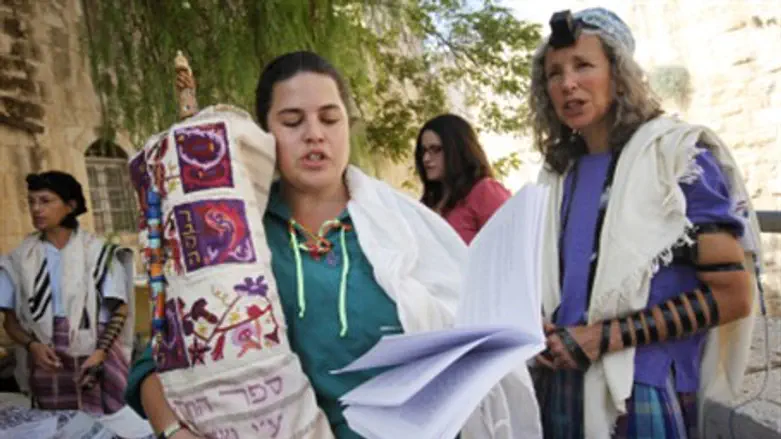
A New York Times article on Sunday pitches a campaign by “Women of the Wall” to breach the rules laid down for behavior at the Kotel and unintentionally reveals the real issue -- Who decides Jewish law?
Under the headline “At a Sacred Site, a Fight Over Women and Prayer,” the newspaper’s new and already controversial Jerusalem bureau chief Judi Rudoren ostensibly told both sides of the story, but overweighed the campaign by women, almost all of them Canadian and American immigrants.
The Women of the Wall pop up in the headlines every several months and succeeded in doing so again earlier this month by trying to arrive at the Kotel with a tallis, the fringed shawl used by men when praying in the morning.
The High Court previously has ruled that women cannot wear a tallis at the wall, so Women of the Wall activist Bonna Devora Haberman tried to get around the order by arriving with a tallis in her backpack.
The "Women of the Wall" have been given a place to pray that is a part of the Wall not frequented by other groups where they can don the accessories they wish, so there is no reason for them to try to hold their services at the Wall plaza where the rules call for continuance of traditional mode of prayers by women, without phylacteries, prayer shawls and reading from the Torah that are the norm in men's services - rules that were upheld by the High Court.
Rudoren immediately worked on readers’ sympathies for the Women of the Wall, writing that Haberman was “tearful” when she said, “How can you say this to me “I’m a Jew. This is my state.”
The statement “This is my state” reveals the goal of those who claim “equality” and that they have an equal say with learned rabbis over what is accepted Jewish practice and law - and can ignore rules laid down by the Rabbi of the Kotel.
Rudoren noted that several Jerusalem restaurants are seeking a kosher certification system that is not run by the government’s rabbinical council.
One Orthodox woman told Arutz Sheva, “If these women really and honesty want equality, let's see them pray every day, three times day, without publicity. The real women of the wall are the ones who come here to pray at dawn every day, not once a month, and they have rights too. They are offended by these women's provocative behavior each time they come.”
The term “equality” is a big draw for Reform and Conservative Jews who sit together during prayers, against Jewish tradition. The separate seating among Orthodox Jews in synagogues provides an opportunity for some to rail against a supposed chauvinist attitude in Jewish tradition. In fact, Jewish law respects women and recognizes and safeguards the inherent differences between men and men instead of trying to change human nature.
Rudoren quoted Elana Sztokman, the director of the Jewish Orthodox Feminist Alliance, as saying, “We have to figure out what does Israel want, what role do we really want religion to have in this state? And it’s happening on the backs of women.”
The statement indicates that the question is not whether religion should be part of the Jewish state but rather who will define the religion – ordained Orthodox rabbis or those who go thorough their own orientation to enter the clergy, emphasizing political and social issues without any basis in Jewish law, except for their interpretation of such expressions as “Love thy neighbor as thyself.”
Women of the Wall leader Anat Hoffman, another immigrant from the United States, tried to make her case by stating that the movement is an “import from abroad” and that “many of Israel’s best inventions were imports. For example: Zionism.”
In fact, Zionism is rooted in the Torah, beginning with the promise to Avraham that future generations would inherit the Land of Israel.
Theodore Herzl, a secular Jew, rejuvenated the modern Zionist movement, but his ambitions were paralleled by orthodox Jewish Zionists. His idea of establishing a Jewish state outside Israel was thoroughly debunked.
Rudoren quoted Steven C. Wernick, the director of the United Synagogue of Conservative Judaism, as proclaiming that “it is not good for the Jewish people, let alone for the State of Israel” that his children “start expressing frustration with Israel as a society because what they hear and see from a distance is not welcoming to them in their religious practice.”
The article correctly points out that the Women of the Wall “is an issue that really brings out the gap between Israeli Jews and American Jews,” a statement attributed to a Reform Jewish immigrant.
Another comment was posted by Shari Eshet, who represents the New York-based National Council of Jewish Women in Israel.
“Secular Israelis do not see this as their problem; to them it’s a bunch of crazy American ladies,” said here. “It’s embarrassing for Israel, it’s embarrassing for Jews, and the American Jewish community is beginning to understand that it’s a slippery slope here.”
The Reform movement has been making inroads against what is falsely called an Orthodox monopoly. Critics of the liberal attitude have pointed out that just as a medical committee must certify doctors before they can practice, the Orthodox rabbis, who have studied years of Talmud, are the ones who decide who can call himself a rabbi.
Nevertheless, the High Court, in one of its last decisions before the departure of liberal court President Dorit Beinisch, earlier this year ordered the government to pay the salary of a Reform rabbi.